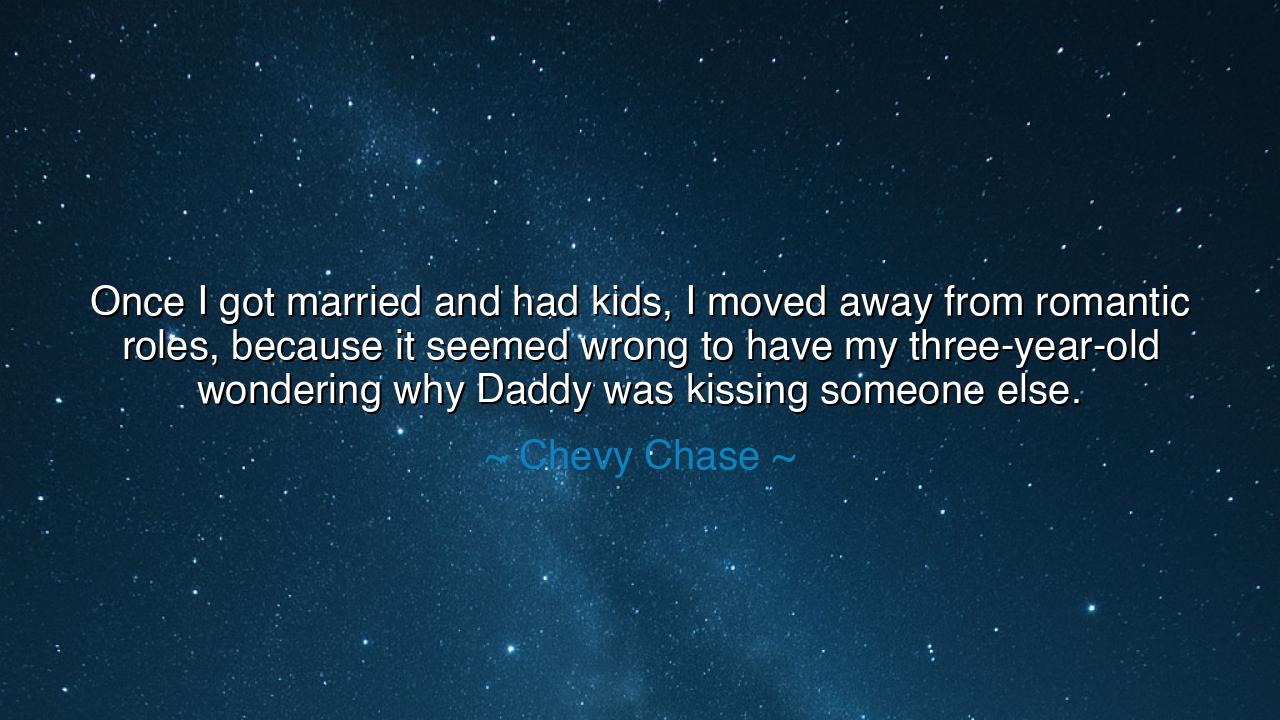
Once I got married and had kids, I moved away from romantic
Once I got married and had kids, I moved away from romantic roles, because it seemed wrong to have my three-year-old wondering why Daddy was kissing someone else.






“Once I got married and had kids, I moved away from romantic roles, because it seemed wrong to have my three-year-old wondering why Daddy was kissing someone else.” Thus spoke Chevy Chase, and his words, though wrapped in the wit of a comedian, shine with the gravity of a man who treasures his household above his fame. For he reveals the sacred tension between the duties of art and the duties of life, between the roles one plays before the world and the role one holds within the walls of home.
The ancients would have understood this conflict. The actors of Greece wore masks upon the stage, portraying gods, lovers, and heroes. Yet when the performance ended, the mask was cast aside, and the man returned to his family and his village. In the theater, he lived in the illusion of passion; at home, he bore the truth of loyalty. Chevy Chase’s choice to forsake certain romantic roles is nothing less than this same ancient wisdom: that art, however great, must never betray the sanctity of one’s true obligations.
For the child sees not illusion, but only truth. A three-year-old cannot distinguish between scripted affection and genuine intimacy. To them, the image of a father embracing another is not “pretend,” but confusing, even wounding. In choosing to protect the clarity of his children’s trust, Chase elevated fatherhood above the fleeting glamour of the screen. In this way, he joined the long line of those who have renounced personal glory for the sake of their families, sacrificing the praise of strangers for the peace of their own household.
Consider the tale of Cincinnatus, the Roman farmer called to be dictator in a time of crisis. He accepted the role briefly, saving the state, yet laid it down as soon as duty was fulfilled, returning to his plow. He could have chased endless power, but he chose family, soil, and simplicity. Chase’s choice mirrors this example: he might have pursued further fame through romantic roles, but he recognized that his higher calling lay in preserving the innocence and stability of his children’s lives.
There is also something heroic in his rejection of false passion. For though the stage and the screen may glamorize desire, the truer test of devotion lies in the daily fidelity of marriage and the nurturing of children. Chase’s words remind us that while audiences cheer the embraces of fictional lovers, the greater love is that which is hidden, constant, and steadfast: the embrace of a father who would rather confuse no one than entertain millions.
From this we learn a vital lesson: not all opportunities are worth seizing, and not all applause is worth the price. The world may offer crowns, but if they tarnish the soul of one’s household, they are crowns of ash. The actor may thrive on stage, but the man must live in truth, for children will one day remember not the roles he played, but the father he was.
Practical action flows clearly: place your highest loyalty where it belongs—upon those who depend on you most. Do not betray your loved ones for the sake of fleeting gain or outward approval. If your path leads you into choices that confuse, weaken, or wound those who look up to you, turn aside and choose integrity instead. In this way, you will not only be remembered as a worker of deeds, but as a guardian of hearts.
So, children of tomorrow, remember Chevy Chase’s wisdom: roles will pass, applause will fade, but the bonds of marriage and the trust of children endure. Guard them fiercely, for in the end, it is not the kisses on stage that matter, but the love that lives, day by day, within the walls of your home.






AAdministratorAdministrator
Welcome, honored guests. Please leave a comment, we will respond soon